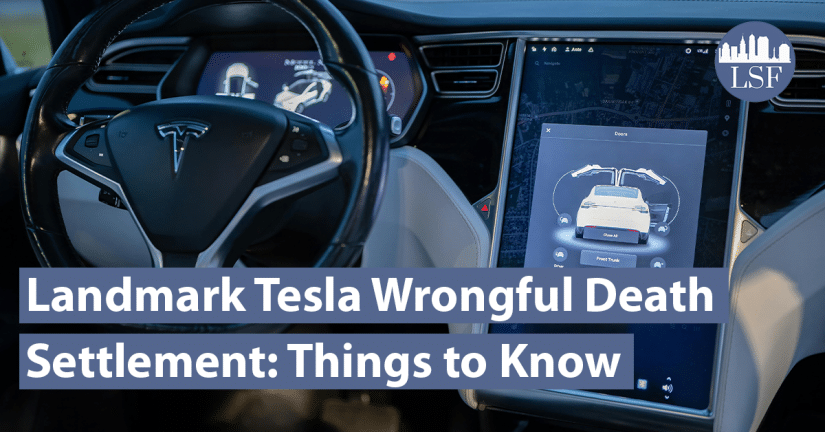Landmark Tesla Wrongful Death Settlement: Things to Know

By Kyle Melling, Attorney at Lowe Scott Fisher Co., LPA
Article Summary: Tesla recently settled a wrongful death lawsuit involving its Autopilot system, marking a significant moment in automotive product liability. The case, stemming from a 2018 crash that killed an Apple engineer, highlighted concerns about the safety and accountability of semi-autonomous driving technologies. This settlement, alongside earlier defense verdicts, underscores the legal complexities and the critical need for scrutiny of collision mitigation systems as they become increasingly prevalent in vehicles worldwide.
After nearly five years of litigation, Tesla has reached its first known settlement in a wrongful death lawsuit stemming from an alleged Autopilot malfunction. The Tesla Wrongful Death Settlement case, which involved the tragic death of an Apple engineer in a 2018 crash while using Tesla’s Autopilot system, has set a significant precedent in automotive product liability involving Collision Mitigation Technology Systems.
Prior to this settlement, the first two known Tesla Auto Product Liability cases were tried in California, and both resulted in Defense Verdicts. In Molander v. Tesla Inc., Tesla prevailed in a Riverside, California court, where jurors decided that Tesla’s Autopilot was not to blame for a fatal crash that killed a driver and seriously injured two passengers. Despite the controversy surrounding its Autopilot technology and ongoing federal investigations into other fatal incidents, Tesla defended the system’s safety. The plaintiffs alleged a defect in Tesla’s Autopilot system, but Tesla argued that the driver’s alcohol consumption and manual steering contributed to the accident. This case marks Tesla’s first court win over a fatality linked to its Autopilot, reflecting ongoing scrutiny and debate over the safety of semi-autonomous driving systems.
On the back of this defense verdict, Tesla settled Huang v. Tesla, also in California. The settlement, which was announced just as the trial was set to commence, has not only captured the attention of the legal community but also highlighted the complexities and potential dangers associated with semi-autonomous driving technologies. The case centered on the argument that Tesla’s Autopilot feature was not only flawed but that Tesla was aware of its shortcomings and failed to address them adequately. Indeed, shortly before this settlement, evidence was unearthed from 2016 in the form of an email from Tesla’s then-president Jon McNeill to Tesla’s Automated Driving Chief and CC’ing Elon Musk himself:
The system performed perfectly, with the smoothness of a human driver. I got so comfortable under Autopilot, that I ended up blowing by exits because I was immersed in emails or calls (I know, I know, not a recommended use)
That email greatly undermined Tesla’s defense that it did not know that drivers using Autopilot would stop paying attention, and/or fail to observe the vehicle and take over the driving if necessary.
This lawsuit’s resolution marks a pivotal moment in the new frontier in the ever-evolving litigation surrounding Collision Mitigation Technology. It also underscores the urgent need for ongoing scrutiny of Collision Mitigation Technologies, which are becoming increasingly common in vehicles across the globe. The implications of this settlement are far-reaching, potentially influencing future litigation involving similar technologies.
Key Takeaways from the Tesla Settlement
1. Precedent in Liability: This settlement may serve as a benchmark for future cases, shaping how liability is determined for manufacturers of semi-autonomous vehicles.
2. Highlighting the importance of discovery: The attorneys litigating the Huang case have spent years battling Tesla for discovery. The extensive discovery phase, which involved a detailed examination of software logs and electronic communications from Tesla, highlighted the crucial need for all the data that these vehicles collect.
3. Public Safety and Manufacturer Accountability: The case has intensified public and legal scrutiny on the safety of Collision Mitigation Technologies, pushing for greater accountability from manufacturers regarding the marketing and deployment of these systems.
Lowe Scott Fisher Co., LPA, has a long history of handling high-stakes automotive product liability cases, including those that involve Collision Mitigation Technologies. Our trial attorneys have a profound understanding of the complexities involved in cases like the recent Tesla settlement.
We encourage personal injury attorneys across Ohio dealing with or encountering similar cases involving these Collision Mitigation Technologies or other complex liability scenarios to reach out. Collaboration could be key in navigating these complex legal landscapes effectively. If you believe you have an automobile product liability case that could benefit from our expertise, or if you require assistance in any related matters, do not hesitate to contact us.
Lowe Scott Fisher Trial Attorneys is well-equipped to handle cases that are both technically complex and legally challenging. We bring a wealth of experience and a track record of success in automotive product liability that can provide invaluable support in achieving justice for your clients.
Conclusion
The Tesla wrongful death settlement is more than just a resolution to a legal battle; it’s a harbinger of the challenges and changes that lie ahead in the field of automotive technology and product liability law. As we continue to advocate for the victims of defective products, we stand ready to assist our colleagues in ensuring that justice is served.
For more information or to discuss a potential case, please contact us at Lowe Scott Fisher Co., LPA. Together, we can work towards a safer future and uphold the standards of justice and integrity that define our profession.
Back To Blog